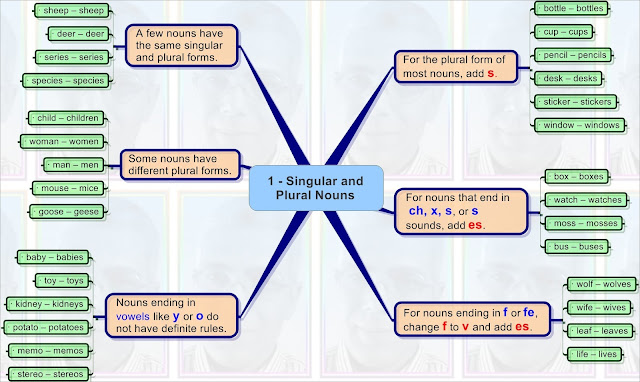Los nombres pueden referirse a cosas que pueden o no ser cuantificadas.
Fonética
Just like the -ed ending, there are three ways of saying the plural “s” ending in English:
[s]
[z]
[ɪz]
ExampleWhen we say the plural of two basic words in English:
- “cats” [kæts]
- “dogs” [dawgz]
the plural “s” is said in two different ways:
- “cats” [kæts] with an [s].
- “cats” [kæts]
- “dogs” [dawgz] with a [z].
- “dogs” [dawgz]
Why does the sound of the plural “s” change?
The goal for English speakers is to speak efficiently, to say the most they can in the shortest amount of time. When there is a change in sound, the change is often caused by the sound right before it. This allows the vocal chords in particular to be more efficient; to continue what they are doing.
Practice and Understand
[t]
Put your hand on the front of your neck and say the sound [t]. What do you feel?
You should feel nothing at all, meaning, there is no vibration in the vocal chords when you say [t].
[d]
Now, put your hand on the front of your neck and say the sound [d]. What do you feel?
You should feel a vibration now. That’s because the vocal chords vibrate when you say the sound [d].
*This vibration or lack of vibration is what causes the plural “s” to sound like a [s] or [z].
[s]
[z]
Put your fingers on the front of your neck and say the [z] sound. What do you feel? You should feel the vibration of the vocal chords.
Rule
- Any time a word has a sound just before the plural “s” that has NO vibration in the vocal chords, the plural “s” will continue the lack of vibration and sound like a [s].
- Any time you have a sound before the plural “s” that has the vibration, the vibration will carry forward and transform the letter “s” into the [z] sound.
- There are also some sounds that require an extra syllable in order to be articulated.
Example
I can’t even say the plural of “bridge” without adding an extra [ɪ] sound before the plural “s”. So we add the extra syllable to say:
“bridges” [brɪdʒ ɪz]
[s]
Voiceless sounds that cause the plural “s” to be pronounced as [s] include:
[p], [t], [k], [f]
Example
weeks [wiyks]
bits [bɪts]
backs [bæks]
briefs [briyfs]
[z]
Voiced sounds that cause the plural “s” to be pronounced as [z] include:
[b], [d], [g], [l], [r], [w], [m], [n], [v], [y]
Example
webs [wɛbz]
beds [bɛdz]
bags [bægz]
bells [bɛlz]
jars [jɑrz]
canoes [kəNUWZ] | (note the [uw] vowel sound ends in a [w])
straws [stʃrɑwz]
limbs [lɪmz]
fans [fænz]
doves [dʌvz]
delays [dəLeYZ]
[ɪz]
The sounds that cause the plural “s” to be pronounced with an additional syllable [ɪz] include:
[tʃ] [dʒ] [s] [z]
Example
watches [WA tʃɪz]
bridges [BRɪ dʒɪz]
judges [dʒʌ dʒɪz]
slices [SlAiY sɪz]
blazes [BLeY zɪz]
Note
The sound of the plural [s] can be important to pronounce accurately if it affects your being clearly understood.
Listen and Repeat
Notice how I connect the plural “s” to the word that follows, and how I de-stress the function words, such as transforming the “of” into [ə], to create linking and music in my speech.
“The dogs are eating at twelve.”
“There are bits of cake on the floor.”
“Judges always wear black in court.”
“The slices of pizza got cold.”
“Please put the three bags in the hallway.”
“The delays at the airport weren’t so bad.”
“We are big fans of that type of music.”
“How many weeks until your trip?”
Fuente:














0 comentarios:
Publicar un comentario